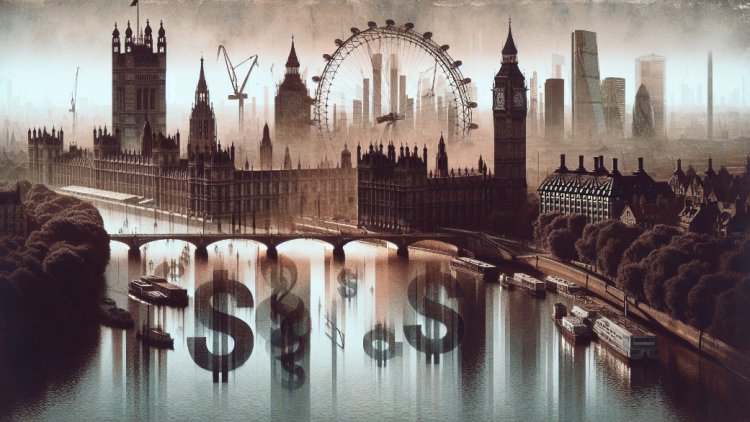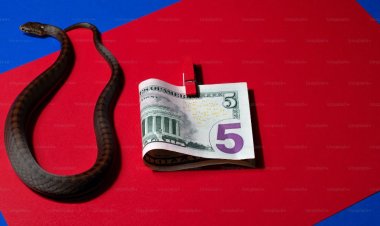London: The Epicenter of Global Dirty Money
Unmask the secrets of Londongrad, the notorious hub for global dirty money. Explore its intricate web of finance, corruption, and hidden wealth, and uncover the human and societal costs.

Introduction
-
London is the dirty money capital of the world.
-
The openness of the UK's financial system
-
Lack of clear and well-enforced rules
-
The impact of dirty money on democracy
London has long been known as the epicenter of global dirty money, with the UK being an open financial hub that attracts corrupt and criminal individuals from around the world. The city has rolled out the red carpet for these individuals, welcoming their wealth and offering a safe haven for their illicit activities.
One of the main reasons why London has become a hotspot for dirty money is the openness of the UK's financial system. With a lack of clear and well-enforced rules, it is easy for individuals to bring their ill-gotten gains into the country and integrate them into the economy without leaving any trace of their criminal activities.
This lack of regulation and enforcement has had a detrimental impact on democracy. Dirty money has the power to corrupt institutions and suborn politicians, eroding the foundations of a free and fair society. The influence of this international oligarchy extends to the media, undermining the freedom of the press and stifling investigative journalism.
The UK government must take decisive action to address this issue. Stronger legislation, stricter enforcement, and cooperation with international partners are needed to tackle the flow of dirty money and protect the integrity of our financial system. Only then can we begin to restore trust in our institutions and safeguard our democracy.
The Origins of Dirty Money in London
The role of the British Empire and Soviet Empire
London's status as the epicenter of global dirty money can be traced back to the legacies of the British Empire and the Soviet Empire. As the British Empire unraveled, it sought new purposes for its outposts, leading to the creation of financial secrecy and shell companies in places like the British Virgin Islands and Channel Islands. These jurisdictions became havens for individuals looking to move their wealth through the global economy without leaving a trace.
Similarly, the collapse of the Soviet Empire in the 1990s resulted in a scramble to grab the wealth of the entire empire. This created a new oligarchy that sought to establish legitimacy and credibility in trusted jurisdictions. London became the meeting point for the dirty money from both empires, attracting corrupt individuals and providing a range of services to legitimize their wealth.
Financial secrecy and shell companies
Financial secrecy and the use of shell companies have played significant roles in the influx of dirty money into London. The ease of registering a company in the UK, coupled with a lack of verification and enforcement, has allowed individuals to hide their true identities and the origins of their wealth. Companies House, the registry where companies are registered, often approves applications within 24 hours without thoroughly checking the information provided.
With the help of lawyers and intermediaries, individuals can integrate their illicit wealth into the UK system by purchasing assets such as UK property. Owning property through offshore shell companies further obscures true ownership and enables individuals to use their wealth as if it were clean. The opacity of ownership structures and the involvement of law firms and real estate agents have facilitated the integration of dirty money into the UK economy.
The liberalization of the financial services sector
The liberalization of the financial services sector, initiated under Margaret Thatcher and continued under subsequent governments, has also contributed to the influx of dirty money into London. The deregulation of the financial industry and the push to attract foreign investment created an environment that allowed corrupt and criminal individuals to exploit the system.
By offering attractive deals and minimal oversight, London became an attractive destination for those seeking to launder their wealth. The financial sector, including banks, played a significant role in facilitating the movement of corrupt wealth around the world, with 86 banks in the UK being involved in such activities.
Political figures welcome Russian money.
Political figures in the UK have been complicit in welcoming Russian money, further exacerbating the issue of dirty money in London. Statements from prominent figures, including Prime Minister Boris Johnson when he was the mayor of London, have indicated a desire to make London a hub for Russian money. The UK government and institutions, such as law firms and real estate agents, have actively embraced Russian money, disregarding its questionable origins.
This welcoming of Russian money has not only allowed individuals with corrupt backgrounds to establish themselves in the UK, but it has also created a network of influence that extends into the highest levels of British politics and business. The integration of Russian business with London's elite has further blurred the line between legitimate business and illicit activities.
To address the issue of dirty money in London, the UK government must implement stronger legislation, enhance enforcement efforts, and cooperate with international partners. Only through decisive action can the flow of dirty money be tackled, the integrity of the financial system protected, and trust in institutions restored.
The Mechanisms of Money Laundering
-
There are four stages: placement, layering, integration, and defense.
-
Use of UK shell companies for money transfers
-
Lack of transparency in company registration
-
Role of lawyers, real estate agents, and banks
-
Ownership of UK property through offshore shell companies
Money laundering involves a series of mechanisms that allow individuals to conceal the origins of their illicit wealth and integrate it into the economy without leaving a trace. Understanding these mechanisms is crucial to addressing the issue of dirty money in London and combating corruption and criminal activities.
The Four Stages of Money Laundering
Money laundering typically involves four key stages: placement, layering, integration, and defense.
-
Placement: This stage involves bringing illicit funds into the country, often through the use of UK shell companies. Individuals transfer their money from foreign bank accounts into these companies, making it easier to integrate the funds into the UK financial system.
-
Layering: In this stage, individuals move the money through a series of complex financial transactions to distance themselves from the illegal source of wealth. UK banks play a significant role in facilitating these transactions, allowing the money to flow around the world.
-
Integration: Once the money has been sufficiently layered, individuals seek to integrate it into the UK system. This often involves purchasing assets, such as UK property, with the help of lawyers and real estate agents. Ownership of property through offshore shell companies further obscures the true ownership and origin of the funds.
-
Defense: The final stage of money laundering involves protecting one's wealth and reputation. London, with its reputation for management law firms and libel laws, becomes a haven for individuals seeking to defend their ill-gotten gains and silence investigative journalists.
Use of UK Shell Companies
UK shell companies play a crucial role in the money laundering process. These companies provide a vehicle for individuals to transfer their funds and hide their true identities. The ease of registering a company in the UK, coupled with a lack of verification and enforcement, allows individuals to evade regulations and maintain anonymity.
Companies House, the registry where companies are registered, often approves applications within 24 hours without thoroughly checking the information provided. This lack of transparency and verification creates an environment where individuals can easily hide the true ownership and origins of their wealth.
Role of Lawyers, Real Estate Agents, and Banks
Lawyers, real estate agents, and banks play significant roles in facilitating money laundering in London. Lawyers and intermediaries help individuals integrate their illicit wealth into the UK system by assisting with the purchase of assets, particularly UK property.
Real estate agents cater to the demands of wealthy individuals, often from kleptocratic regimes, who seek to invest in prestigious properties in London. Ownership of these properties through offshore shell companies further masks the true beneficiaries and allows individuals to use their wealth as if it were clean.
Banks, both in the UK and abroad, enable the movement of corrupt wealth around the world through complex financial transactions. With 86 banks in the UK involved in such activities, the financial sector plays a significant role in facilitating money laundering and the integration of dirty money into the UK economy.
Ownership of UK Property through Offshore Shell Companies
One common method used to launder money in London is through the ownership of UK property using offshore shell companies. By purchasing property through these companies, individuals can hide their true ownership and the origins of their wealth.
This practice creates an opaque ownership structure for some of the most valuable homes in the UK. Roughly 84,000 homes are owned anonymously, and £6.7 billion worth of UK property has been purchased with suspicious wealth. Russian individuals, connected to corruption or the Kremlin, own £830 million worth of UK property through shell companies based in crown dependencies and overseas territories.
In order to address the issue of money laundering and the ownership of UK property by corrupt individuals, stronger legislation, enhanced enforcement efforts, and increased transparency are necessary. Only through these measures can we begin to dismantle the mechanisms that enable the flow of dirty money and protect the integrity of our financial system.
Defending wealth and reputation in London
-
London as a safe haven for kleptocrats
-
Libel laws and reputation management
-
Influence of oligarchs in politics and media
-
The role of law firms and banks in facilitating dirty money
-
Integration of Russian business with London's elite
London has gained a reputation as a safe haven for kleptocrats and corrupt and criminal individuals from around the world. The city's openness and lack of clear and well-enforced rules make it an attractive destination for those seeking to hide and integrate their illicit wealth into the economy.
One of the contributing factors to London's appeal for dirty money is its libel laws and reputation management services. The city's reputation management law firms and claimant-friendly libel laws provide a haven for individuals to defend their ill-gotten gains and silence investigative journalists.
Oligarchs and individuals with questionable origins of wealth have gained significant influence in politics and the media in London. Political figures, including Prime Minister Boris Johnson, have openly welcomed Russian money, disregarding its questionable origins. This integration of Russian business with London's elite has blurred the line between legitimate business and illicit activities.
Law firms and banks play a crucial role in facilitating the flow of dirty money in London. Lawyers and intermediaries assist individuals in integrating their illicit wealth into the UK system, particularly through the purchase of assets such as UK property. Banks enable the movement of corrupt wealth around the world through complex financial transactions.
The integration of Russian business with London's political and business elite has not only enabled the flow of dirty money but also created a network of influence that extends to the highest levels of British politics and business. This network poses a threat to the integrity of our institutions and democracy.
Addressing the issue of dirty money in London requires stronger legislation, enhanced enforcement efforts, and increased transparency. The UK government must take decisive action to dismantle the mechanisms that enable the flow of dirty money, protect the integrity of the financial system, and restore trust in our institutions.
Calls for Action and Legislative Changes
Challenges faced by law enforcement agencies
Law enforcement agencies in the UK face significant challenges in tackling the issue of dirty money in London. The large influx of corrupt and criminal individuals, coupled with the complexity of financial transactions involved in money laundering, often outpaces the resources and capabilities of these agencies. The Serious Fraud Office, for example, has a limited budget in comparison to the vast amounts of money involved in illicit activities.
In addition, law enforcement agencies often find themselves up against powerful lawyers and intermediaries who work for corrupt individuals. These professionals have the means to mount strong legal defenses, which can make it difficult for law enforcement to hold them accountable.
Introduction of the Economic Crime Bill
The UK government has recognized the need for stronger legislation to address the flow of dirty money in London. The recent passing of the Economic Crime Bill is a landmark development in this regard. The bill introduces measures to enhance enforcement efforts and increase transparency in financial transactions.
Property register to tackle anonymity in ownership
One key provision of the Economic Crime Bill is the establishment of a property register. Overseas companies that purchase UK property will be required to disclose the true owners and controllers of those companies. This measure aims to tackle the anonymity of property ownership, which has been commonly used to hide the origins of illicit wealth.
By making beneficial ownership information publicly available, the property register will increase transparency and make it harder for individuals to disguise their money through offshore entities.
Unexplained wealth orders and their limitations
Unexplained wealth orders (UWOs) have been introduced as an investigative tool to target individuals with assets that seem disproportionate to their known sources of income. However, the effectiveness of UWOs has been limited. There have been only four successful cases since their introduction in 2018, and the amount of assets seized through UWOs remains relatively small.
The new Economic Crime Bill aims to address some of the limitations of UWOs. It includes provisions to cap the liability of law enforcement agencies for costs incurred in unsuccessful UWO cases, making it easier for agencies to pursue these orders without fear of financial repercussions.
The importance of stronger enforcement and sanctions
To effectively combat the flow of dirty money and protect the integrity of the financial system, stronger enforcement efforts and stricter sanctions are crucial. This includes providing law enforcement agencies with the necessary resources and capabilities to investigate and prosecute cases of money laundering.
Additionally, international cooperation is essential to tackling the global nature of dirty money flows. The UK government should work closely with its international partners to share information, coordinate investigations, and implement measures to prevent the entry of illicit funds into the country.
By implementing these legislative changes and taking decisive action, the UK government can begin to dismantle the mechanisms that enable the flow of dirty money in London. This will not only protect the integrity of our institutions but also restore trust in the financial system and safeguard our democracy.
Moving Towards a Solution
-
Limiting entry to bad actors while keeping London open
-
Cracking down on secrecy and complicity in kleptocracy
-
Potential costs and consequences of taking action
-
The need to dismantle our complicity in kleptocracy
-
The importance of societal values and accountability
To address the issue of dirty money in London, it is crucial to move towards a solution that limits the entry of bad actors while keeping London open for legitimate business and investment. This can be achieved through a combination of stronger legislation, stricter enforcement, and international cooperation.
Limiting entry to bad actors while keeping London open
One of the challenges in tackling dirty money is finding a balance between preventing the entry of corrupt and criminal individuals while maintaining London's status as an open financial hub. It is important to implement measures that target bad actors without hindering legitimate business and investment.
Cracking down on secrecy and complicity in kleptocracy
A key aspect of addressing dirty money is to crack down on secrecy and complicity in kleptocracy. This includes tightening regulations and enforcement, particularly in areas such as company registration and ownership transparency. By holding individuals and institutions accountable for their actions, it becomes harder for them to hide behind offshore entities and disguise the origins of their wealth.
Potential costs and consequences of taking action
Taking action against dirty money may have potential costs and consequences. This includes the possibility of an exodus of businesses linked to corrupt sources of wealth and financial repercussions for professionals who have benefited from the flow of dirty money. However, these costs should be viewed in the context of protecting the integrity of the financial system and restoring trust in institutions.
The need to dismantle our complicity in kleptocracy
It is imperative to dismantle our complicity in kleptocracy by implementing stricter regulations, enhancing enforcement efforts, and refusing to enable the flow of dirty money. This requires a comprehensive approach that addresses the loopholes in the current system and holds individuals and institutions accountable for their involvement in facilitating money laundering.
The importance of societal values and accountability
Addressing the issue of dirty money goes beyond legislative changes and enforcement efforts. It requires a shift in societal values and a commitment to accountability. This includes promoting transparency, ethical business practices, and responsible investment. By prioritizing these values, we can create an environment that is resistant to the influence of dirty money and ensure the integrity of our institutions.
Conclusion
-
The ongoing challenge of dirty money in London
-
The impact on democratic institutions and the free press
-
The need for action and commitment to change
-
The corrosive nature of dirty money in society
The issue of dirty money in London remains an ongoing challenge that needs to be addressed. The city has long been known as the epicenter of global dirty money, attracting corrupt and criminal individuals from around the world. The openness of the UK's financial system and the lack of clear and well-enforced rules have made it easy for these individuals to bring their ill-gotten gains into the country and integrate them into the economy without leaving a trace.
This influx of dirty money has had a detrimental impact on democratic institutions and the free press. Corrupt wealth has the power to corrupt institutions and suborn politicians, eroding the foundations of a free and fair society. The influence of international oligarchs extends even to the media, undermining the free press and stifling investigative journalism. This erosion of democratic values and the free flow of information is a serious threat to the integrity of our society.
To address this issue, decisive action and a commitment to change are needed. The UK government must implement stronger legislation, enhance enforcement efforts, and cooperate with international partners to tackle the flow of dirty money and protect the integrity of our financial system. By taking these steps, we can begin to restore trust in our institutions and safeguard our democracy.
It is important to recognize the corrosive nature of dirty money for society as a whole. The integration of illicit wealth into the UK system perpetuates a culture of corruption and undermines the values that hold our society together. By allowing dirty money to flow freely, we are enabling the enrichment of corrupt individuals and the erosion of trust in our institutions.
In conclusion, addressing the challenge of dirty money in London is imperative. It requires strong legislation, stricter enforcement, and a commitment to transparency and accountability. By taking decisive action, we can protect our democratic institutions, preserve the free press, and build a society that is resistant to the influence of dirty money.



 admin
admin 










